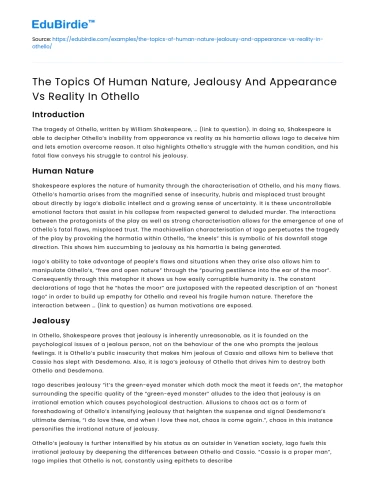Introduction
The tragedy of Othello, written by William Shakespeare, … (link to question). In doing so, Shakespeare is able to decipher Othello’s inability from appearance vs reality as his hamartia allows Iago to deceive him and lets emotion overcome reason. It also highlights Othello’s struggle with the human condition, and his fatal flaw conveys his struggle to control his jealousy.
Human Nature
Shakespeare explores the nature of humanity through the characterisation of Othello, and his many flaws. Othello’s hamartia arises from the magnified sense of insecurity, hubris and misplaced trust brought about directly by Iago’s diabolic intellect and a growing sense of uncertainty. It is these uncontrollable emotional factors that assist in his collapse from respected general to deluded murder. The interactions between the protagonists of the play as well as strong characterisation allows for the emergence of one of Othello's fatal flaws, misplaced trust. The machiavellian characterisation of Iago perpetuates the tragedy of the play by provoking the harmatia within Othello, “he kneels” this is symbolic of his downfall stage direction. This shows him succumbing to jealousy as his hamartia is being generated.
Save your time!
We can take care of your essay
- Proper editing and formatting
- Free revision, title page, and bibliography
- Flexible prices and money-back guarantee
Iago’s ability to take advantage of people’s flaws and situations when they arise also allows him to manipulate Othello’s, “free and open nature” through the “pouring pestilence into the ear of the moor”. Consequently through this metaphor it shows us how easily corruptible humanity is. The constant declarations of Iago that he “hates the moor” are juxtaposed with the repeated description of an “honest Iago” in order to build up empathy for Othello and reveal his fragile human nature. Therefore the interaction between … (link to question) as human motivations are exposed.
Jealousy
In Othello, Shakespeare proves that jealousy is inherently unreasonable, as it is founded on the psychological issues of a jealous person, not on the behaviour of the one who prompts the jealous feelings. It is Othello’s public insecurity that makes him jealous of Cassio and allows him to believe that Cassio has slept with Desdemona. Also, it is Iago’s jealousy of Othello that drives him to destroy both Othello and Desdemona.
Iago describes jealousy “it’s the green-eyed monster which doth mock the meat it feeds on”, the metaphor surrounding the specific quality of the “green-eyed monster” alludes to the idea that jealousy is an irrational emotion which causes psychological destruction. Allusions to chaos act as a form of foreshadowing of Othello’s intensifying jealousy that heighten the suspense and signal Desdemona’s ultimate demise, “I do love thee, and when I love thee not, chaos is come again.”, chaos in this instance personifies the irrational nature of jealousy.
Othello’s jealousy is further intensified by his status as an outsider in Venetian society, Iago fuels this irrational jealousy by deepening the differences between Othello and Cassio. “Cassio is a proper man”, Iago implies that Othello is not, constantly using epithets to describe him “old black ram”, thus causing further insecurities and leads to the fracturing of Othello’s psyche.
Appearance vs Reality
Shakespeare uses the medium of drama to highlight the recurring theme that one should not always trust what they see. The audience and the players both grapple with distinguishing appearance and reality. This is best seen through the actions of Iago who is driven by his jealousy to achieve his evil motives. Shakespeare display’s Iago’s manipulative ways to the audience through dramatic irony whereby the audience can see his reality, however, the characters cannot. This is clearly seen through the constant portrayal of Iago as “A man he is of honesty and trust” which indeed strongly contradicts his true nature through dramatic irony.
Shakespeare's idea of appearance vs reality is further intensified by Iago’s dialogue, “I am not what I am”, as Iago is essentially foreshadowing who he truly is, he is basically telling the audience that he is not what he appears to be and in this case he appears to be loyal to Othello however he plans to sabotage Othello. “Oh, I have lost my reputation! I have lost the immortal part of myself, and what remains is bestial.” The bestial imagery implies that Cassio reputations act as appearance, Cassio is actually a violent man but keeps up appearances and so usually never drinks.
During the play, dramatic irony allows us to realise that Othello has labelled Iago, whom we know to be “janus-faced” and deceptive, “I am not what I am”, as “a man of exceeding honesty.”
The central message which this theme implies is that it is a human trait which is found within all contexts and hence in becomes universally significant. Shakespeare aims to highlight humanity's inability to judge true from false as well as to highlight humanities deceptive nature and potentially warn humanity of deceptive individuals.
Conclusion
Ultimately, Shakespeare’s play “Othello” has a (refer to question) as it explores the many pertinent universal ideas within society. Shakespeare sends warnings to his audience and the society, to avoid (link to themes), as such social issues will lead to tragedy as they provoke flaws that lie under the surface of every human being.






 Stuck on your essay?
Stuck on your essay?

